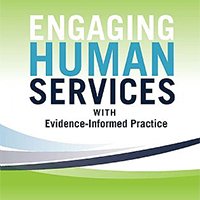By Paul R. Pace

Debbie Plath, PhD, is an Australian social work practitioner, educator, and researcher. Plath discusses her NASW Press book, Engaging Human Services with Evidence-Informed Practice.
What inspired this book?
I wanted to produce a practical guide that assists social workers and managers with the process of applying evidence to practice, that also recognizes contextual and relationship factors impacting on social work practice.
Another motivation was to shift the focus of responsibility for incorporating research evidence from the individual practitioner to the organizational level. Without organizational strategies, resources, and support, it is unreasonable to expect social workers to adopt evidence-informed practice in the critically reflective manner that social work practice demands.
Why is it important that social workers adopt an EIP model?
Social workers, and the human service organizations we work in, have an ethical responsibility to provide services to service users that we are confident make a positive difference. Research evidence can inform our understanding of how to service our clients most effectively. Critical reflection on research evidence can also jolt us out of set ways of thinking and doing things. It prompts us to consider alternative ways of practicing that could be more effective.
What are some key takeaways for readers?
Evidence from a range of sources should be critically appraised for credibility, relevance, and applicability to the particular circumstances of clients in the human service practice and cultural setting.
Regardless of how rigorous the evidence gathering and appraisal process is, however, we need to accept that evidence is provisional and dynamic. We will never fully understand the individual, organizational and social worlds in which we work. If we are to take action in real-world contexts, we need to be well-informed and critically reflective, but also pragmatic.
EIP in the human services must be a relational process as well as a rational process. At the client level, focusing on relationship-building enables us to assess the appropriateness of interventions and to understand the impact of the work we do. At the organizational level, relationship building is necessary in the organizational change process that supports critically reflective and evidence-informed practice.
NASW Press products are available in both print and online formats at naswpress.org